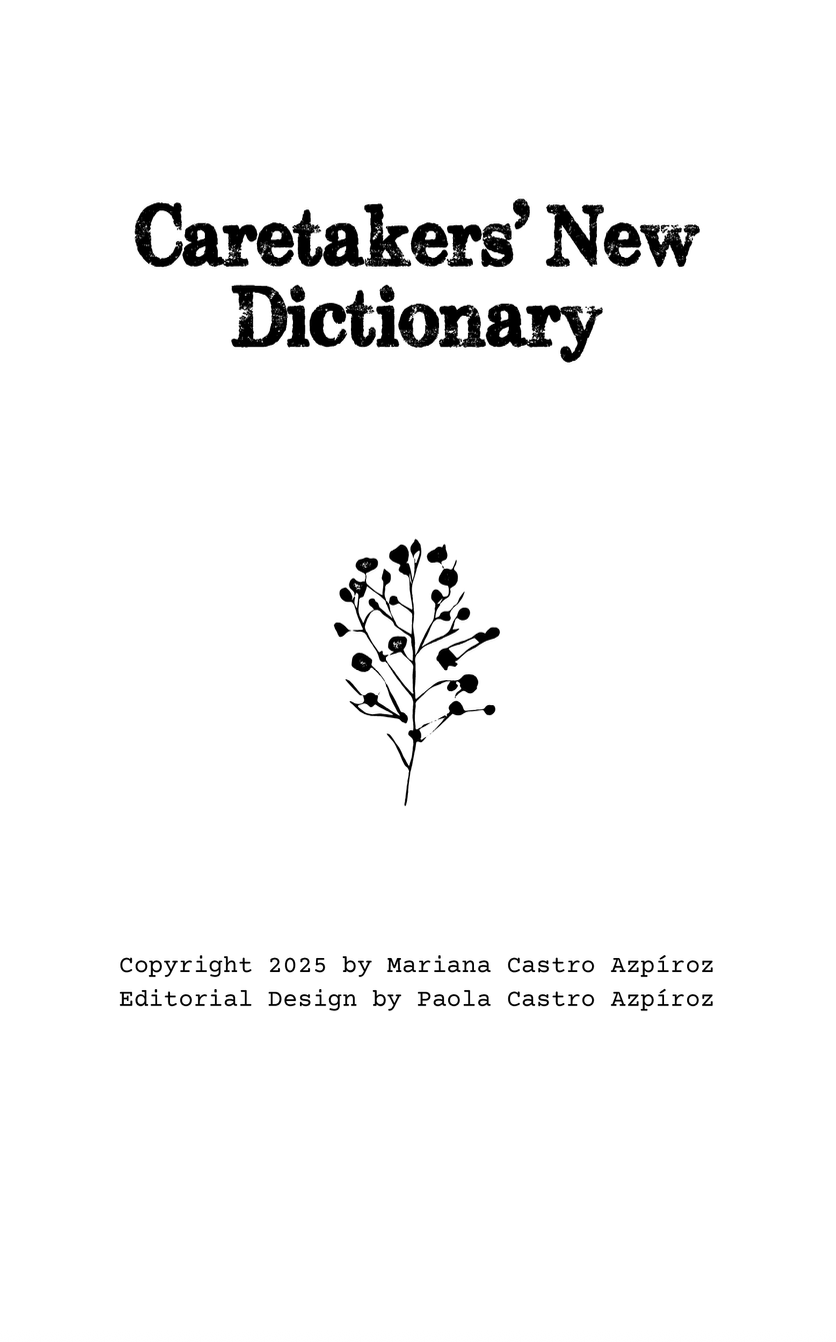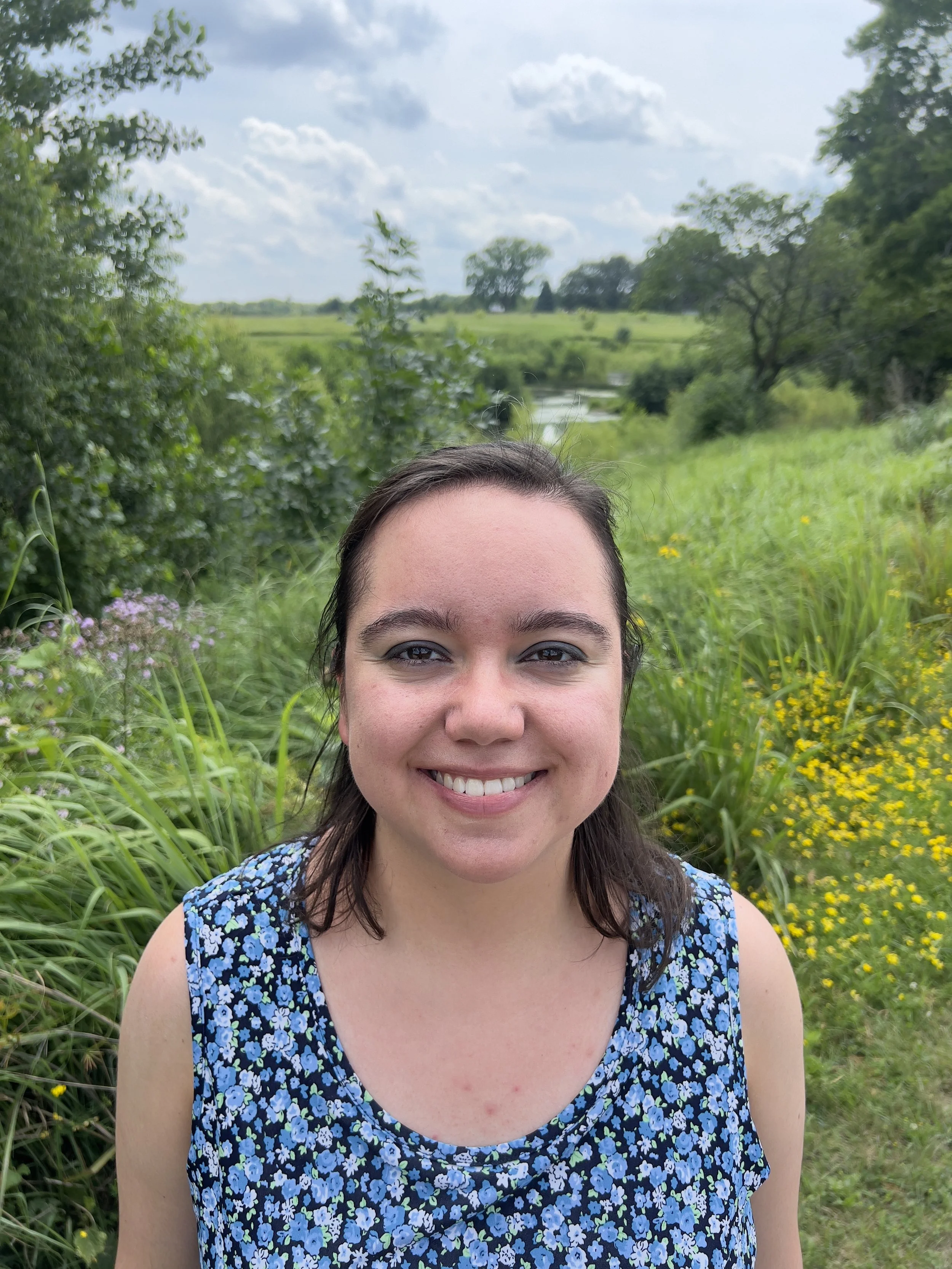Mariana Castro Azpíroz
Editorial design of the zine by Paola Castro Azpíroz
Mariana Castro Azpíroz’s “Caretakers’ New Dictionary” is a zine that uses speculative writing to imagine which terms would be commonly used in 2075 if we lived in her vision of a desirable climate future: centered around ethics of care, arts of noticing, and multispecies kinship.
The piece highlights the power of language in shaping our understanding and relationships with the environment and other beings (of every species). It invites the audience to engage in decolonizing the English language by questioning and reflecting upon the concepts behind current words, challenging the way language is presently being used, and playing with the creation of new vocabulary through generative prompts.
Creatively using the form of dictionary entries, “Caretakers’ New Dictionary” presents novel terms, showcases words from other languages that provide valuable perspectives, and explores relevant existing terms in the English language: from the obsolete to the recently coined. It is divided into four main sections–"New Terms," "Alternative Worldviews," "Reclaimed Terms," and "Reframed Terms"–allowing for multiple possible readings. Each section begins with a poem and concludes with generative exercises inviting the readers to imagine original and experimental words that could better reflect the world that we want to live in now and in the future. A QR code on the back of the zine allows the audience to share those new terms and actively participate in the act of co-creation.
Mariana Castro Azpíroz
29, Ames, Iowa USA
I graduated college as a molecular biologist, but soon found my passion for sharing with others what fascinates me about the world through science communication. Later, when I joined the Creative Writing and Environment MFA program at Iowa State University, I believed I was strictly a nonfiction writer, and that my thesis would be a collection of science communication essays about climate change. I also had a different concept of “environment” then.
I left Mexico City to start graduate school after the pandemic, trying to figure out my path, in the need of a vegvísir. In Iowa, I was greeted with unbelievable support and kindness from the start, and I discovered what a sense of community felt like. When I became a research assistant for the Stories of the Seasons program, I participated in learning circles centered on relationship-building and layering multiple ways of knowing. Through a framework of ethics of care and storytelling- and arts-based methodologies, we fostered sustainable farming practices and climate action projects.
I learned how to weave climate narratives of women with different roles in the farming community, researchers, and artists; the academic/scientific language with practical, experiential, and embodied wisdom; climate data and human stories. This summer, I spent three weeks living next to Lake Okoboji and taking a literature and multispecies kinship course. I discovered how to make a home, no matter how short your stay in a place is, and the importance of acknowledging all the beings that you share a space with. I practiced place-making, kin-making, and listening to the environment. I seemed to be finding my path, and my thesis morphed into a collection of braided kinship essays, poems, and collages. I wanted to share my transformative experience with others.
I was raised in a bilingual and bicultural household and have always been fascinated by language. I am interested in how it both shapes and reflects the way we see and understand the world and wanted to explore how environmental discourse affects whether we feel overwhelmed or apathetic towards the climate crisis rather than inspired to take action. The call for Climate Storytelling 2027 presented me with an opportunity to dive deeper in my exploration of language and wonder how to reframe and rewrite the story of climate change in a way that invites all voices to join the narrative, that fosters community and multispecies kinship. My vision for a desirable climate future involves finding the stories of care, kindness, and hope that have already unfolded, and imagining the ones to come so that we may enact them. I believe that one of the pathways to this lies in words themselves.
"Caretakers’ New Dictionary" is a zine that uses speculative writing–through poetry, dictionary entries, and generative prompts–to imagine the language of a 2075 centered around these values. In order to find our way through such a complex socioenvironmental crisis, we need a multilayered, polyvocal response. With a welcoming vegvísir on the cover, my zine provides some space for it.
-
See “Mapping Landscapes of Hope” section: https://wfan.org/digital-eco-calendar






